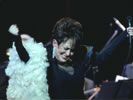Eye For Film >> Movies >> Cafe De Los Maestros (2008) Film Review
At the beginning of this film, we hear the oft-quoted saying “You can’t separate tango from life.”
Café de los Maestros traces the history of tango music through the memories of orchestra members. At the celebrated Teatro Colón in Buenos Aires. We follow them through informal interviews around the time of a major performance. The film takes us through bars and cafes, recalling the story of tango from its birthplace, and also looking at the connection with Uruguay.

There is plenty of fine music in the hour and a half of this rather haphazard movie. There are many quotations that will be referenced in tracing the lives of past maestros. But the appeal is limited. Even tango aficionados may not feel the need to drop everything.
The main problems fall into two categories. Touted as a parallel to Buena Vista Social Club, the film tries to ‘immortalise’ the musical heritage of Argentina the way Wim Wenders’ movie does for Cuba. But whereas Wenders went street-level, to the humble players who embodied the culture in an instinctive way, Café De Los Maestros goes to the top, the most prestigious and glamorous, including famed film composer Gustavo Santaolalla. The effect is like going to Buenos Aires as a VIP tourist. You will go to the best bright lights and hear the highest paid performers. It probably won’t mean much to you because you haven’t grown up in that culture of bandoneons and the stories that form the emotional background of tango. As almost any intrepid visitor to the capital will know, the way to experience tango is to go to the streets, to La Boca, where tango is performed in the public square on Sunday afternoons, or in small intimate bars. Listening to a tango orchestra before getting a feel for tango is like experiencing Shostakovich as an introduction to classical music.
The second problem for anyone watching this outside of the South American tango culture is that most Westerners relate to tango initially through the dance. With even a few tango lessons, you can imagine a dance interpretation of the passionate music. The dance gives you a window to connect more easily to the austere sounds. It also introduces you to the dramatic nature of the music, acted out in the dance. Café De Los Maestros focuses on the music first, with dance as a poor second. Dance is not treated as primary or explained, although there are some pleasant shots of tango dancing and the old musicians do recall their own dancing days. Unlike Sally Potter’s The Tango Lesson, which transports the viewer into the world of the tango dancer, Café De Los Maestros is a film about music made by musicians.
Café De Los Maestros also fails in much of its execution. The mish-mash of stories are rambling and there is insufficient background information to tie them up. It is as if the persons reminiscing are talking to people already familiar with their tales (which might, however, be fine for an Argentinean audience). Buenos Aires is a city of stunning architecture, embodying much of the best of old Europe. Apart from a brief glimpse of the central street, this is underused. The outdoor photography, apart from one excellent scene of dancers on a raised dais, is low both in production values and in choice of shots with which to display the grandeur of this remarkable city.
One advantage that seeing the film has over going to a top concert however is that subtitles are included. It really does help to know what the singers are being so passionate about. But when she sings of the “tango born in the suburbs,’’ or the “bittersweet slum of tango,” why not show us these world famous suburbs? Many of them are a photographer’s paradise. Some of the stories are evocative. “He who can play silence, can play tango well.” Or, “People danced in the rain with their umbrellas.” But sadly a radio version would have conveyed just as much.
When the film moves to Montevideo (the capital of Uruguay, separated from Buenos Aires by a short sea trip), there is no mention of the geography to give the viewer context. Scenes of football matches and other completely unrelated social practices seem even more out of place.
There is a difference between enthusing about something to a fellow enthusiast and enthusing in a way a newcomer can understand and pick up on. The greatest statement of the film is probably “You don’t understand the happiness we feel when we find ourselves here.” Having been to Argentina, I hope I have maybe a small inkling. But based on this film, the answer would more likely be, “No, we don’t.”
Reviewed on: 06 Jul 2008

















